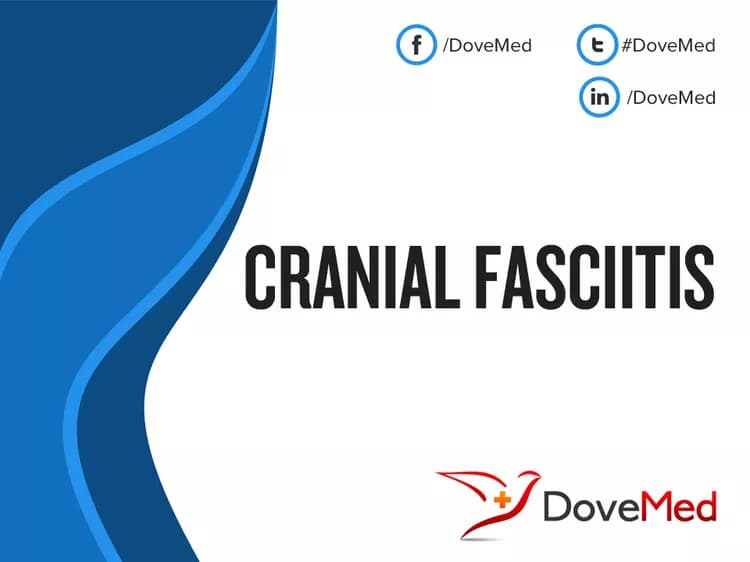What are the other Names for this Condition? (Also known as/Synonyms)
- Cranial Fasciitis of Childhood
- Cranial Nodular Fasciitis
- Cranial Pseudosarcomatous Fasciitis
What is Cranial Fasciitis? (Definition/Background Information)
- Cranial Fasciitis is a very rare, rapidly-growing mass, which is usually confined within the head region. It has similar features to another condition, called nodular fasciitis
- The cause of occurrence of the tumor is unknown, though it is believed that there may be a link with familial adenomatous polyposis (a genetic condition)
- Cranial Fasciitis almost only occurs in infants and children. Due to its rapid growth, the tumor is often misdiagnosed as a fibrosarcoma. However, the tumor is benign and often disappears on its own, without any treatment
- A complete surgical removal is the treatment of choice, in case the benign tumor condition does not diminish on its own. In such cases, the prognosis is excellent.
Who gets Cranial Fasciitis? (Age and Sex Distribution)
- Cranial Fasciitis is almost exclusively seen in infants and small children, below the age of 6 years
- Boys are affected more than girls, in a 2:1 ratio
- There does not appear to be any particular racial or ethnic predilection
What are the Risk Factors for Cranial Fasciitis? (Predisposing Factors)
No clear risk factors are associated with Cranial Fasciitis. However, some researchers believe that the following factors may play a role in its development:
- It may be associated with a genetic disorder, called familial adenomatous polyposis (FAP)
- A prior trauma
It is important to note that having a risk factor does not mean that one will get the condition. A risk factor increases ones chances of getting a condition compared to an individual without the risk factors. Some risk factors are more important than others.
Also, not having a risk factor does not mean that an individual will not get the condition. It is always important to discuss the effect of risk factors with your healthcare provider.
What are the Causes of Cranial Fasciitis? (Etiology)
The cause of Cranial Fasciitis formation is unknown. But, some researchers consider the tumor to be a reactive process to a trauma.
What are the Signs and Symptoms of Cranial Fasciitis?
The signs and symptoms of Cranial Fasciitis of Childhood include:
- The tumor occurs in the skull (cranium) and the presence of a mass may be observed. Cranial Fasciitis is a rapidly-growing tumorous mass
- They tumor size may range from anywhere between 1-9 cm; the average size of the tumor is around 2.5 cm. Over time, the tumor may shrink and reduce in size, by its own
- No significant signs and symptoms like pain, fever, etc. may be noticed
The presence of Cranial Fasciitis in infants and children may indicate an early sign of multiple colon polyp formation (in the future). Hence, children with a known diagnosis of the condition may be helped by early screening colonoscopies. Your healthcare providers may recommend a colonoscopic procedure, depending on the individual clinical scenario.
How is Cranial Fasciitis Diagnosed?
A diagnosis of Cranial Fasciitis may involve:
- A physical examination and evaluation of complete medical history by a healthcare provider
- X-ray of the skull
- CT scan of the head and neck
- A tissue biopsy, where the tissue is examined by a pathologist under the microscope, to arrive at a definitive diagnosis. The pathologist may perform additional tests on the tissue biopsy to confirm the same
- A differential diagnosis may include: Infantile fibrosarcoma, desmoid fibromatosis, infantile fibromatosis, and low-grade myofibrosarcoma of head and neck
Many clinical conditions may have similar signs and symptoms. Your healthcare provider may perform additional tests to rule out other clinical conditions to arrive at a definitive diagnosis.
What are the possible Complications of Cranial Fasciitis?
Generally, no significant complications of Cranial Fasciitis are noted. However the following may occur:
- The tumor may be misdiagnosed as a fibrosarcoma
- The rapidly-proliferating tumor may erode into the skull bone
How is Cranial Fasciitis Treated?
- The treatment of choice for Cranial Fasciitis is a complete excision of the tumor. Sometimes, the underlying bone may be ‘curretaged’ (scraped)
- The tumor does not recur on complete surgical removal
How can Cranial Fasciitis be Prevented?
Currently, there are no specific methods or guidelines to prevent Cranial Fasciitis.
What is the Prognosis of Cranial Fasciitis? (Outcomes/Resolutions)
The prognosis of Cranial Fasciitis of Childhood is generally excellent with surgical treatment. Recurrence of the tumor is generally not observed, after its surgical removal.
Additional and Relevant Useful Information for Cranial Fasciitis:
The histologic features of Cranial Fasciitis, when examined by a pathologist under a microscope, are similar to nodular fasciitis.
The following article link will help you understand nodular fasciitis.
http://www.dovemed.com/diseases-conditions/nodular-fasciitis/
Related Articles
Test Your Knowledge
Asked by users
Related Centers
Related Specialties
Related Physicians
Related Procedures
Related Resources
Join DoveHubs
and connect with fellow professionals


0 Comments
Please log in to post a comment.